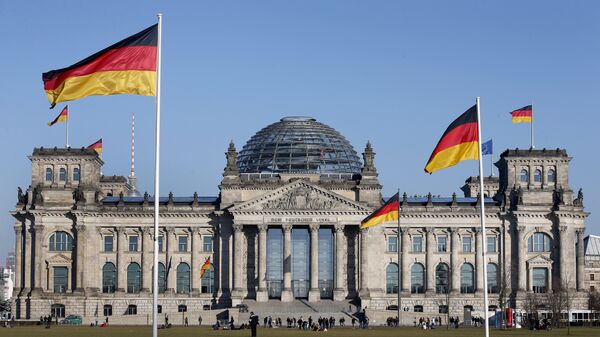BERLIN (Sputnik) — The US House of Representatives approved by a 419-3 vote on Tuesday a new version of a bill that would impose sweeping sanctions on Russia, Iran and North Korea, and limit President Donald Trump’s ability to lift the restrictions on Moscow. The measures target Russia's defense, intelligence, mining, shipping and railway industries, and restrict dealings with Russian banks and energy companies.
"This is concerning not only for the German industry… Sanctions against Russia should not become a tool of industrial policy in the US interests," spokesman Martin Schaefer said at a press briefing.
New US sanctions against Russia should not target European commercial interests, the German government said, pointing out that close EU-US coordination in their sanctions policy is essential.
"We believe that the European industry should not become the target of US sanctions," German Federal Government spokeswoman Ulrike Demmer said at a briefing. "Moreover, it is important to continue close coordination between the US and the EU in the sanctions policy toward Russia."
Meanwhile, Association of German Chambers of Commerce and Industry (DIHK) head of foreign relations department Volker Treier said that the US sanctions bill would hurt the German economy, and force German and European companies to abandon large-scale projects in Russia.
"These sanctions also affect the German economy… If German companies are no longer allowed to work on pipeline projects, important projects for security of supply can come to a standstill," Treier told the Handelsblatt newspaper on Tuesday.
He added that the expansion of the sanctions will mean that German and European companies would have "to abandon other large-scale projects in Russia in order to avoid high fines in the United States."
In April, Gazprom's subsidiary Nord Stream 2 AG signed a deal with French Engie, UK’s Royal Dutch Shell, Austria’s OMV and Germany's Uniper and Wintershall, which agreed to provide part of long-term financing of the gas pipeline project, estimated at 9.5 billion euros ($10.6 billion).
The Nord Stream 2 project presumes the construction of two gas pipelines with a combined annual capacity of 55 billion cubic meters of gas. The new pipeline is planned to be laid along the existing Nord Stream pipeline route from the Russian coast through the Baltic Sea, on to a hub in Germany.





